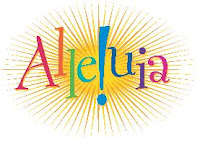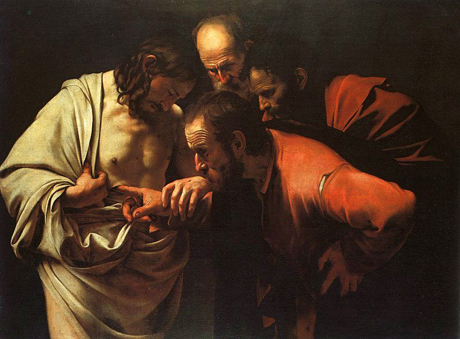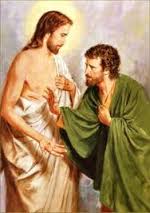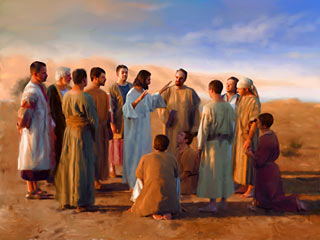
– 11-04-2021 – Second Sunday of Easter
Second Sunday of Easter
Divine Mercy Sunday
Gospel reading John 20:19-31
vs.19 In the evening of the same day, the first day of the week, the doors were closed in the room where the disciples were, for fear of the Jews. Jesus came and stood among them. He said to them, “Peace be with you,”
vs.20 and showed them his hands and his side. The disciples were filled with joy when they saw the Lord,
vs.21 and he said to them again, “Peace be with you.
As the Father sent me, so am I sending you.”
vs.22 After saying this he breathed on them and said, “Receive the Holy Spirit.
vs.23 For those whose sins you forgive, they are forgiven;
for those whose sins you retain, they are retained.”
vs.24 Thomas, called the Twin, who was one of the Twelve, was not with them when Jesus came.
vs.25 When the disciples said, “We have seen the Lord,” he answered,
“Unless I see the holes that the nails made in his hands and can put my finger into the holes they made, and unless I can put my hand into his side, I refuse to believe.”
 vs.26 Eight days later the disciples were in the house again and Thomas was with them. The doors were closed, but Jesus came in and stood among them.
vs.26 Eight days later the disciples were in the house again and Thomas was with them. The doors were closed, but Jesus came in and stood among them.
“Peace be with you“ he said.
vs.27 Then he spoke to Thomas,
“Put your finger here; look, here are my hands. Give me your hand; put it into my side. Doubt no longer but believe.”
vs.28 Thomas replied, “My Lord and my God!”
vs.29 Jesus said to him:
“You believe because you can see me. Happy are those who have not seen and yet believe.”
vs.30 There were many other signs that Jesus worked and the disciples saw, but they are not recorded in this book.
vs.31 These are recorded so that you may believe that Jesus is the Christ, the Son of God, and believing this you may have life through his name.
******************************************
Michel DeVerteuil: A Trinidadian Priest, director of the Centre of Biblical renewal
Thomas O’Loughlin:Professor of Historical Theology University of Nottingham NG7 2RD
Sean Goan: Studied scripture in Rome, Jerusalem and Chicago and teaches at a Le Chéile School
Donal Neary SJ: Editor of The Sacred Heart Messenger and National Director of The Apostleship of Prayer
****************************************
Michel DeVerteuil
Lectio Divina with the Sunday Gospels
www.columba.ie
General Comments
Today’s gospel reading, like all of St John’s gospel, is an interweaving of several themes. It is not possible to follow up all the themes together; we must focus on one at a time, going deeply into it and allowing it to reveal some deep truth about Jesus, about ourselves and about life.
Here I invite you to focus on the apostle Thomas; this is in accord with the Catholic church’s liturgical tradition for the Second Sunday of Easter. Therefore, although the reading includes two of Jesus’ resurrection appearances – both of them deeply moving – we stay with the second, the dialogue between Jesus and Thomas, and let the earlier appearance provide the context. We are free to identify either with Thomas or with Jesus, but not with both at the same time.
 We need to be clear on how we understand Thomas. The popular interpretation puts him in a bad light, as “doubting Thomas“. This however is not the movement of the text, which culminates in Thomas’ admirable act of faith, the most explicit in the New Testament – “My Lord and my God!”.
We need to be clear on how we understand Thomas. The popular interpretation puts him in a bad light, as “doubting Thomas“. This however is not the movement of the text, which culminates in Thomas’ admirable act of faith, the most explicit in the New Testament – “My Lord and my God!”.
We are more in accord with the spirit of the text, therefore, when we look at Thomas as a model of faith. He was the right to insist that before he could believe in Jesus’ resurrection he must see the holes the nails made in his hands, put his finger into the holes and his hand into the great wound made by the centurion’s lance.
Thomas teaches us the important lesson that we must not separate the resurrection from the cross, since we are called to be followers of Jesus. He also teaches us the truth of the Church and of our individual spiritual growth. We cannot live the life of grace, the “risen life”, authentically unless we bear in our bodies the wounds of the cross. This means being conscious that we develop the capacity to love and to be loved only by dying to ourselves. Our wounds are also a constant reminder of our frailty, and that it is God’s grace that raises us up to new life.
St Paul’s epistles show that the first Christians needed the corrective of Thomas’ faith. They tended to relate with the risen Jesus without reference to his crucifixion. They forgot that they were called to be “followers of Jesus crucified“, choosing to die with him so that they could rise with him (see especially 1 Corinthians 1).
We Christians fall into the same error today when our lives and our teachings proclaim an abstract “disembodied” Jesus, dispenser of graces and teacher of morality – we forget the historical person who was put to death for proclaiming the kingdom of God.
Thomas professes the true faith of the Church. We too must insist that the Jesus we follow is the true Jesus, the one whose risen body bears the wounds of Calvary.
Jesus is the model leader and spiritual guide. He is pleased to give Thomas the assurance he is looking for, and then challenges him to look forward to the day when he will believe without seeing – always in the Jesus who passes through death to resurrection.
The blessedness of believing without seeing came from the experience of the early Church. Jesus is not moralizing, but inviting Thomas – and us – to celebrate great people of faith, in our local communities and world-wide, who take up their cross with confidence in the resurrection.
As always in our meditation we must not limit ourselves to personal relationships. We celebrate the resurrection faith lived by communities, nations and cultures.
“You who remain ever faithful even when we are unfaithful, forgive our sins and grant that we may bear true witness to you before all men and women.“ …Pope John Paul II, Service of Forgiveness, March 2000
Prayer reflection
Lord,
We thank you for the moments of grace of the recent Lenten season,
when – as individuals and as a church community – we walked in the footsteps of Jesus by passing from death to new life.
We thank you in particular for the great day when our church publicly asked forgiveness from other religions and cultures.
We thank you for Pope John Paul who, like Jesus with St Thomas, invited us to see the holes that the nails of arrogance and self-righteousness had made in the body of Christ, and to put our fingers into the holes, to put our hands into the huge wound which the lust for power has made in his side,
so that we could recognize how, just as you raised Jesus from the dead, you do not allow his Body, the church, to remain in the tomb, but always raise her up to new life.
 Lord, we thank you for the times when reconciliation
Lord, we thank you for the times when reconciliation
emerged triumphantly from the tomb of conflict:
*the spirit of dialogue between our church and Jews, Muslims, Hindus, and African traditional religions;
* the European Union created by former enemies;
*the Good Friday agreement in Northern Ireland;
* the peace processes growing around the world
Lord, we thank you for the efforts many people of peace trying to engage of the military in Iraq, Gaza, the Ukraine, the Lebanon, the Congo and other nations at war.
We pray that they will hear your voice calling on them all to remember those who have been hurt, who still have holes that the nails made in their hands and can put their finger into the holes they made, and unless they can put their hands into their side, they will refuse to believe.
Do not let us forget the terrible legacy of hatred and resentment which has still to be overcome;
* invite us to put our fingers into the holes made by nails, our hands into the great wounds made by lances, so that we can recognize with awe and wonder the spark of your divine life that is within us all.
*Remind us too of those who worked for peace during the long years of conflict
when it seemed that they were working in vain. How blessed were they who did not see
and yet continued to believe in your power to bring new life into the world.
“Whoever sees anything of God, sees nothing of God .” …Meister Eckhart
Lord, lead us to the blessedness of not seeing and yet believing.
“Go for broke, always try to do too much, dispense with safety nets, aim for the stars.” … Salman Rushdie
Lord, we thank you for friends, leaders and spiritual guides who challenge us as Jesus challenged Thomas.
When we commit ourselves to a cause because we have tested its reality, they invite us to experience the blessedness of believing without seeing.
Lord, Forgive us that we want to help those in need without sharing their pain,
we look for their resurrection but do not want to see their wounds:
*young people have been deeply hurt and we serve them with pious exhortations;
* we become impatient with those who continue to mourn the death of a spouse or a child;
* we think we can restore a broken relationship by merely saying we are sorry;
* we propose reconciliation between warring factions without acknowledging past wrongs;
* we pray for peace in the world and do not agonize over its terrible injustices.
We thank you for people like Thomas who will not let us get away with easy solutions;
they insist that we must see the holes that nails have made in the hands of victims,
put our fingers into the holes and our hands into wounds that lances have made in their sides,
and only then believe that they have within them the capacity to rise to new life.
“We admitted to God, to ourselves, and to another human being, the exact nature of our wrongs.” …Step 5 (in the 12 Step Method of Alcoholics Anonymous)
Lord, when we are converted from an addiction to alcohol, drugs, power or sex,
we are so anxious to make a new start
that we try to forget the hurt which was at the root of our problem
– the loneliness of our childhood
– the sense of racial inferiority
– our disability
– the fear of failure.
We thank you for sending us friends who insist that we must face the reality of the past.
We pray that like Jesus welcoming Thomas,
we will invite them to put their fingers into the holes the nails have made
and their hands into our sides, so that they can walk with us in our new life.
***********************************
Thomas O’Loughlin
Liturgical Resources for the Year of Matthew
www.columba.ie
Introduction to the Celebration
Last Sunday we cried out with joy that ‘Today Christ is risen! Christ has conquered evil and death.‘
This theme is so central for us that we need an extended time to ponder the day of resurrection: so here we are again today thinking about the day he rose. Easter day is the day he told us that our sins were forgiven, it is the day he charged us to be forgiving. On Easter day he gave us new life, and charged us to be life-giving. So as we stand here celebrating resurrection, how do we stand in our lives as people claiming this belief?
theme is so central for us that we need an extended time to ponder the day of resurrection: so here we are again today thinking about the day he rose. Easter day is the day he told us that our sins were forgiven, it is the day he charged us to be forgiving. On Easter day he gave us new life, and charged us to be life-giving. So as we stand here celebrating resurrection, how do we stand in our lives as people claiming this belief?
Homily Notes
1. Only one of the three elements in this gospel passage can be explored in the homily: to try to do more is to risk confusion and overload. I have chosen the image of the risen Christ who appears among his followers with the greeting: ‘Peace be with you‘, and who follows this up with a sending out of the disciples to be bearers of peace and reconciliation.
2. Forgiveness, peace-making, and reconciliation are not concepts that we run together in our minds nor automatically link to our identity as Christian, yet they are at the heart of the meaning of resurrection. Let us note how we tend to react to these themes.
3. Forgiveness brings to mind a very individualist notion of getting rid of that which hinders me from getting to where I want to go: heaven. Forgiveness can be seen as a kind of sacred selfishness or a personal escape hatch from doom. Seeking forgiveness can then become an introverted process of reducing the mystery of God’s love into my desire ‘to get off the hook’.
 4. Reconciliation and peacemaking seem to be sideline issues for most Christians: one more good work that you might engage in if that is your ‘thing‘. Having a conscious attitude of seeking to overcome division or taking a positive stance towards the question of peace can be seen to be areas where some Christians might feel they have a role, but that these could not be said to be defining issues for Christians. Many First World Christians might even go so far as to say that even if one were uninterested in the building-up of a society of peace one could still call oneself a Christian and a believer in resurrection.
4. Reconciliation and peacemaking seem to be sideline issues for most Christians: one more good work that you might engage in if that is your ‘thing‘. Having a conscious attitude of seeking to overcome division or taking a positive stance towards the question of peace can be seen to be areas where some Christians might feel they have a role, but that these could not be said to be defining issues for Christians. Many First World Christians might even go so far as to say that even if one were uninterested in the building-up of a society of peace one could still call oneself a Christian and a believer in resurrection.
5. When we hear of ‘forgiving and retaining sins‘ we think first of the priest in the confessional in the highly structured environment of the sacrament. The notion of ‘retained sins’ brings to mind many negative images of being frightened in the confessional and ‘the church’ wielding spiritual ‘power’. This command is therefore primarily a commissioning ceremony of giving out power and authorisation to the apostles and their successors. This range of ideas, limiting forgiveness to a specific sacramental moment often with negative echoes, can seriously impair our seeing the larger significance of this part of Christ’s resurrection message.
 6. To be a Christian is to be one who is forgiven, and so one who forgives. ‘Forgive us our trespasses as we forgive those who trespass against us.‘ This forgiveness is declared to us in the Father raising Christ from death: death and destruction are not to have the final say in human life. This forgiveness and victory are shared with us in Christ’s gift of the Spirit. We are a people who, far from being cut-off from God, have God dwelling within us.
6. To be a Christian is to be one who is forgiven, and so one who forgives. ‘Forgive us our trespasses as we forgive those who trespass against us.‘ This forgiveness is declared to us in the Father raising Christ from death: death and destruction are not to have the final say in human life. This forgiveness and victory are shared with us in Christ’s gift of the Spirit. We are a people who, far from being cut-off from God, have God dwelling within us.
7. This people of the resurrection is then commanded to share this forgiveness and peace in their actions: it is the acceptance of this divine programme that constitutes real belief in resurrection. So the followers are constituted as a group who have a task to fulfil for the whole world: they must be the bearers of forgiveness. It they carry out this task then peace and for King). This is a ministry that Christ sends us out into the world to perform as his agents. It is a ministry not in some restricted sense of a job or function in the church’s administration or liturgy, nor in a special sense of a sacred encounter with a sacred minister (priest), but in the fundamental sense of a service performed to a suffering humanity. The risen Christ looks with love on all who suffer and are in bondage in one way or another, and sends us to bring peace and freedom. This is a central task of us Christians as a group and of each of us. It should be that to know there are Christians is to know that there are people who go around working for peace and proclaiming that God is forgiving.
8. Even in the case of the specific instance of forgiveness we call the Sacrament of Reconciliation we express the belief that the basic mission to forgive and reconcile belongs to the whole group: ‘… the Father of mercies, through the death and resurrection of the Son … sent the Spirit … for the forgiveness of sins … through the ministry of the church (the sacramental formula of absolution).
9. However, knowing that peace-making and reconciliation is central to our role as Christians and our witness as a group is one thing, moving beyond this is something else again. The temptation is to harangue and preach: we must be reconciling! we must be peace-making! we must condemn violence and the cries go on and on. But such harangues make little difference in practice. Perhaps it is more useful to become aware of the complexity of our situation.
First, we all are in favour of peace and goodness and reconciliation — it is almost axiomatic, like saying ‘humans want to be happy.‘
But, second, while this is what we claim to want, most of us have vested interests in strife in some shape or form: be it in relationships, in the way we earn a living, in our national pride, or in more obviously exploitational activities. We want peace but only in so far as it is equivalent to our victory or at the very least only in so far as our own apple cart is not upset.
Third, we must be aware of how precious our own positions are to us and how we dread having to change our minds or lifestyles. This change is painful and cuts deep. Peace making is only easy for those with no stake in the present situation.
Finally, we must note that we as Christians have an abysmal track-record regarding peace. Hence it is all too easy to root around in Christian tradition and find justification for any type of intolerance and this makes the whole notion of peacemaking seem less urgent. Memories can be the great authorisation of strife and hatred, and to challenge some long-championed position in theology, politics, business, relationship, or social customs can seem both treacherous and foolhardy.
10. It is in this personal analysis of the contrast between, on the one hand, how big a stake so many of us have in violence, strife, struggle, and a culture of death, with, on the other hand, the command to forgive and make peace, that we individually discover the cost of believing in Christ as the conqueror of death. To even start the examination of this cost of discipleship in our lives is the first victory of peace. Do not ask ‘Do I believe in the resurrection? — that can be a cosy religious word-game; but ask: Am I prepared to take the discomfiture, loss of pride, or perhaps loss of income that comes with working for peace, development, and reconciliation (cf ‘development [of the Third World] is another name for peace,’ Paul VI in Populorum progressio)? Peace-making is never soppy, usually costly, and rarely easy.
***********************************
Sean Goan
Let the reader understand
www.columba.ie
Gospel John 20: 19-31
In this very packed Gospel, different facets of the Easter mystery are presented. Firstly we note that Jesus appears to the community gathered on a Sunday, they rejoice at his presence and receive through him the gift of the Holy Spirit and with this are given a mission, they are sent just as Jesus himself was. In these verses we have as good a summary of what Sunday Eucharist is all about as we will ever find. In short, it is about joy in the presence of the Risen Lord who give us his peace so that we can continue his task of revealing God to the world. Thankfully Thomas is missing because his refusal to believe means that the following Sunday we need to gather again and once again as a community of faith encounter Christ among us. Now, by a wonderful irony, it is Thomas who leads us in our appropriate response as we acknowledge Jesus as ‘Our Lord and Our God‘. The words addressed to Thomas by Jesus are for the generations of Christians who have continued to proclaim the Easter message ever since: ‘Blessed are those who have not seen and yet believe.‘
Reflection

Jesus explains how the kingdom will grow.
Today’s readings originated with different communities at different times in the life of the early church but there is a striking similarity in their insistence that believing in the resurrection heralds a change in the way we live. We simply cannot be true believers if we close our hearts to those in need around us. If we accept the risen Christ and the promise of new life that he brings then we must be engaged in bringing about the kingdom of God. It is not characterised by a private piety but by an inclusive love which reaches out to those who are most in need. Today’s gospel gives us John’s Pentecost and reminds us that all that we would do in the name of Jesus is to be done in the power of the Holy Spirit.
************************************
Donal Neary SJ
Gospel Reflections
www.messenger.ie/bookshop/
Growing in Faith
Our church community faces many big questions about the place of women, our views on sexuality, the need for consultation and for dialogue. We need to know what all of us believe, not just our leaders. We need to know how people find it to live their faith, in these areas of sexuality, justice, migration, ministry and other realities today. Recent Synods and letters of the Pope have tried to connect theory and lived faith.
 There is a need to be able to grapple with the demands of today and the message of the gospel; To be able to discern our path in the peace and joy of the Easter message, knowing we don’t all have to agree with each other to say to say ‘my Lord and my God’.
There is a need to be able to grapple with the demands of today and the message of the gospel; To be able to discern our path in the peace and joy of the Easter message, knowing we don’t all have to agree with each other to say to say ‘my Lord and my God’.
We are the people who are happy to believe; to show we are a community of faith and of joy, and we want to spread this faith that lives for justice and compassion.
We will never get it fully right. But we can get it better and better if we unite with the Lord and hear each other with respect. That is our challenge at Easter. May the Lord bring the best out of our faith in bad days, and help us live with and enjoy the best of our faith in the good times. We want to make alive what is best in our Christianity.
Thomas doubted at times;
Can I share my doubts of belief with the Lord?
Lord, I believe in you, strengthen my belief.